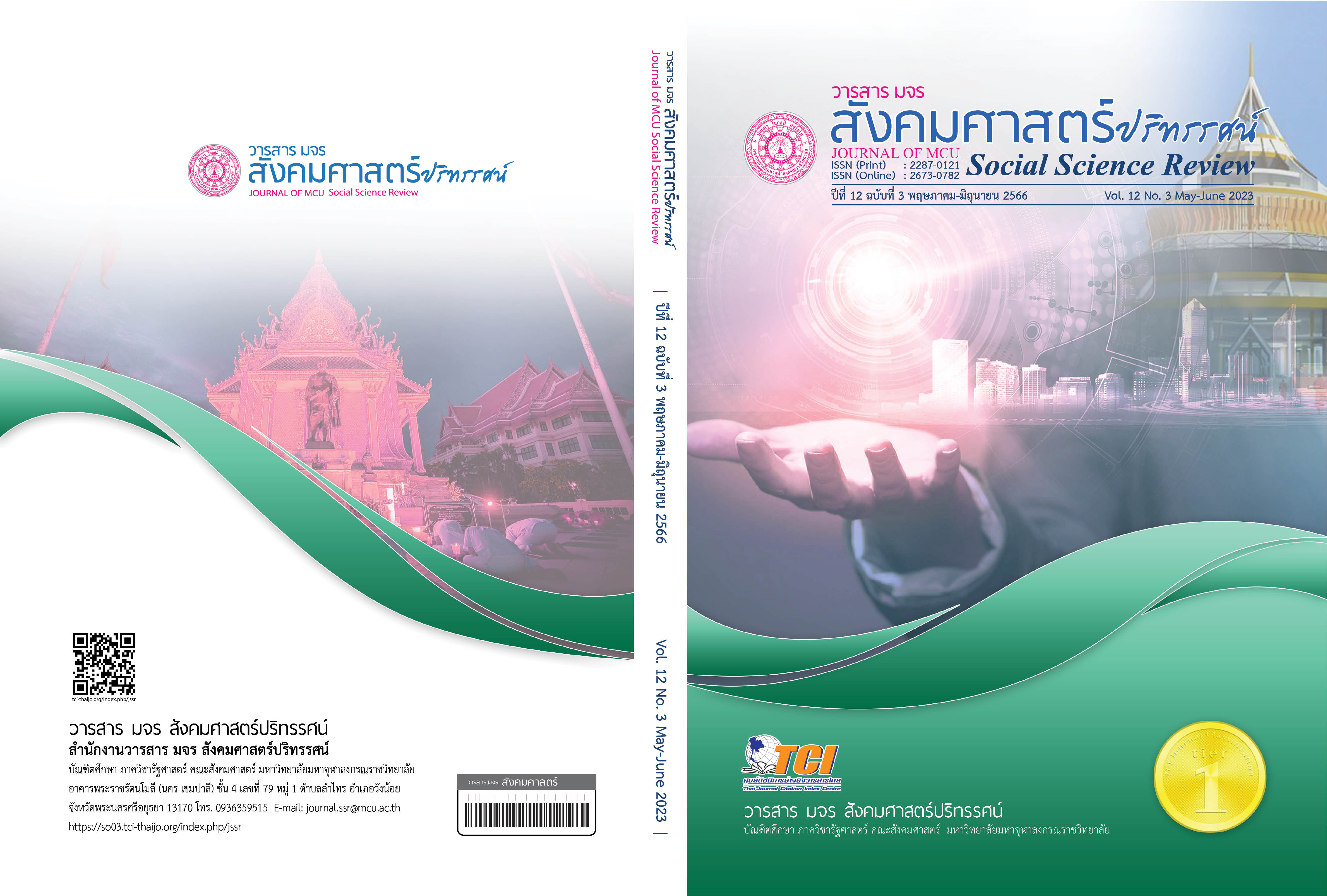การศึกษานโยบายของพรรคการเมืองในการหาเสียงเลือกตั้ง พ.ศ.2566 กับนโยบายเชิงพุทธที่ประชาชนไทยคาดหวัง
คำสำคัญ:
นโยบายของพรรคการเมือง, การหาเสียงเลือกตั้ง พ.ศ.2566, นโยบายเชิงพุทธบทคัดย่อ
บทความวิชาการนี้ มีวัตถุประสงค์เพื่อนำเสนอ 1. โครงสร้างของพรรคการเมืองในประเทศไทย 2. นโยบายการหาเสียงเลือกตั้งของพรรคใหญ่ พ.ศ.2566 3)นโยบายเชิงพุทธที่ประชาชนคาดหวัง นำเสนอได้ดังนี้ 1.พรรคการเมืองมี 4 รูปแบบ รูปแบบที่ 1 คือ พรรคการเมืองแบบชนชั้นนำ รูปแบบที่ 2 คือ พรรคการเมืองแบบมวลชน รูปแบบที่ 3 คือ พรรคการเมืองเน้นการชนะการเลือกตั้งเป็นหลัก รูปแบบที่ 4 คือ พรรคการเมืองแบบตัวแทนรัฐ ทุกรูปแบบมีการรณรงค์หาเสียงเลือกตั้งโดยกลยุทธ์ 15 Cs เช่น Strength จุดแข็งของนโยบายพรรคการเมือง หรือผู้สมัครสมาชิกผู้แทนราษฎร เป็นต้น 2. นโยบายการหาเสียงเลือกตั้งของพรรคใหญ่ ในแต่ละพรรคใช้ในการหาเสียงมีความแตกต่างกันออกไป ส่วนใหญ่เป็นนโยบายที่ทุกพรรคให้ความสำคัญ คือ นโยบายการแก้ไขปัญหาเศรษฐกิจ การแก้ไขปัญหาคอร์รัปชั่น การคมนาคม ยาเสพติด เกษตรกร ปัจจัยพื้นฐานของชีวิต การศึกษาที่ดี สาธารณสุข การเป็นประชาคมอาเซียน การรักษาทรัพยากรรากฐาน การบริหารที่เป็นธรรมาภิบาล การปรับปรุงกฎหมายและแก้ไขให้ถูกต้อง รวมถึงสวัสดิการผู้สูงอายุ การลดความเหลื่อมล้ำ การเข้าถึงสาธารณสุข เป็นต้น 3. ความคาดหวังของประชาชน คือ ประชาธิปไตยและการมีส่วนร่วมอย่างเป็นรูปธรรม ส่วนการบูรณาการหลักธรรม 3 หลักคือ หลักศีลช่วยแก้ปัญหาคอร์รัปชั่น หลักสังคหวัตถุ 4 ช่วยแก้ปัญหาเศรษฐกิจ และหลักไตรสิกขาเป็นคุณธรรมของผู้นำซึ่งเป็นผู้กำหนดนโยบาย
เอกสารอ้างอิง
กรุงเทพธุรกิจ. (2566). “ก้าวไกล” เปิดนโยบาย “การศึกษาไทยก้าวหน้า” ชูเรียนฟรีจริง กำจัดอำนาจนิยม. สืบค้น 15 มีนาคม 2566, จาก https://www.bangkokbiznews.com/politics/1047921
ไทยเกอร์นิวส์. (2566). เปิด 10 นโยบายพรรคเพื่อไทย สู้ศึกเลือกตั้ง 2566 ได้ใจประชาชนแค่ไหน. สืบค้น วันที่ 14 มีนาคม 2566, จาก thethaiger.com/th/news/786293/
ธนพันธ์ ไล่ประกอบทรัพย์. (2564). การพัฒนากระบวนการและเครื่องมือการกำหนดนโยบายสาธารณะของพรรคการเมืองไทย (รายงานการวิจัย). กรุงเทพฯ: สถาบันพระปกเกล้า.
พระพรหมคุณาภรณ์ (ป.อ. ปยุตฺโต). (2553). พจนานุกรมพุทธศาสตร์ ฉบับประมวลธรรม (พิมพ์ครั้งที่ 18). นนทบุรี: โรงพิมพ์เพิ่มทรัพย์การพิมพ์.
มหาวิทยาลัยมหาจุฬาลงกรณราชวิทยาลัย. (2539). พระไตรปิฎกภาษาไทย ฉบับมหาจุฬาลงกรณราชวิทยาลัย. กรุงเทพฯ: โรงพิมพ์มหาจุฬาลงกรณราชวิทยาลัย.
ระพีพร ศรีจําปา. (2548). ถอดรหัสความเหมือนที่แตกต่าง กลยุทธ์การหาเสียงกับการตลาด. นนทบุรี: สยามธุรกิจ.
Katz, R. (2006). Party in democratic theory. In R. S. Katz, & W. Crotty. Handbook of party politics.
Krouwel, A. (2006). Party models. In R. S. Katz & W. Crotty (Eds.). Handbook of party politics.
THE STANDARD. (2566). ทำแล้ว ทำอยู่ ทำต่อ เปิดนโยบายชุดแรก รวมไทยสร้างชาติ โดย พล.อ. ประยุทธ์ จันทร์โอชา. สืบค้น วันที่ 14 มีนาคม 2566, จาก https://thestandard.co/united-thai-nation-party-policy/
TNN Online. (2566). เลือกตั้ง 2566 ส่องนโยบายสาธารณสุข “พรรคภูมิใจไทย”. สืบค้น วันที่ 14 มีนาคม 2566 https://www.tnnthailand.com/news/election/140629/
Today. (2566). พลังประชารัฐ เปิดนโยบายผู้สูงอายุให้เงินสวัสดิการแบบขั้นบันไดเกิน 80 ปีรับ 5,000 บาท. สืบค้น วันที่ 14 มีนาคม 2566, จาก workpointtoday.com/politicspom2102/
______. (2566). ส่องนโยบายพรรคการเมือง แก้ปัญหาฝุ่น PM 2.5 เปิดศึกเลือกตั้ง 2566. สืบค้นวันที่ 14 มีนาคม 2566, จาก https://workpointtoday.com/vote-pm2-5/
ดาวน์โหลด
เผยแพร่แล้ว
รูปแบบการอ้างอิง
ฉบับ
ประเภทบทความ
สัญญาอนุญาต
ลิขสิทธิ์ (c) 2023 วารสาร มจร สังคมศาสตร์ปริทรรศน์

อนุญาตภายใต้เงื่อนไข Creative Commons Attribution-NonCommercial-NoDerivatives 4.0 International License.
เพื่อให้เป็นไปตามกฎหมายลิขสิทธิ์ ผู้นิพนธ์ทุกท่านต้องลงลายมือชื่อในแบบฟอร์มใบมอบลิขสิทธิ์บทความให้แก่วารสารฯ พร้อมกับบทความต้นฉบับที่ได้แก้ไขครั้งสุดท้าย นอกจากนี้ ผู้นิพนธ์ทุกท่านต้องยืนยันว่าบทความต้นฉบับที่ส่งมาตีพิมพ์นั้น ได้ส่งมาตีพิมพ์เฉพาะในวารสาร มจร สังคมศาสตร์ปริทรรศน์ เพียงแห่งเดียวเท่านั้น หากมีการใช้ภาพหรือตารางหรือเนื้อหาอื่นๆ ของผู้นิพนธ์อื่นที่ปรากฏในสิ่งตีพิมพ์อื่นมาแล้ว ผู้นิพนธ์ต้องขออนุญาตเจ้าของลิขสิทธิ์ก่อน พร้อมทั้งแสดงหนังสือที่ได้รับการยินยอมต่อบรรณาธิการ ก่อนที่บทความจะได้รับการตีพิมพ์ หากไม่เป็นไปตามข้อกำหนดเบื้องต้น ทางวารสารจะถอดบทความของท่านออกโดยไม่มีข้อยกเว้นใดๆ ทั้งสิ้น





